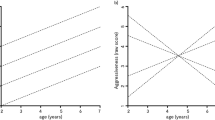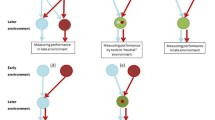Abstract
Perhaps the most basic tenet of development is that behavior is subject to the multiple influences of genes and environments. In fact, it is the dynamic, temporal interaction between genetic and environmental factors that yields different developmental outcomes. Few would disagree with this view today. However, in the middle of the 20th century, when experimental rearing paradigms were first developed and studied in rhesus macaques, the view was different. Behavior patterns were construed as being controlled by either genes or the environment. Ethologists studied species-typical behaviors called fixed action patterns— “fixed” because they were thought to be uninfluenced by experience. In a similar manner, psychologists studied learned behavior that was thought not to have any genetic basis. This dichotomous view permeated the science of the time. Some took on the task of “proving” that specific behavior patterns were innate and developing the methodology to do so (Lorenz, 1950); others attempted to show that organisms were essentially molded by their experiences (Skinner, 1975). There were other voices arguing that all behavior was under both genetic and environmental control (Lehrman, 1970; Schneirla, 1957), but this interactionist notion had not yet taken firm hold. It is important to remember that the early studies of rearing in nonhuman primates took place in this context.
Access this chapter
Tax calculation will be finalised at checkout
Purchases are for personal use only
Preview
Unable to display preview. Download preview PDF.
Similar content being viewed by others
References
Alexander, B.K., and Harlow, H.F. (1965). Social behavior of juvenile rhesus monkeys subjected to different rearing conditions during the first six months of life. Zool. Jb. Abt. Allgemeine Zool. Physiol. Tiere 71:489–508.
Arling, G.L., and Harlow, H.F. (1967). Effects of social deprivation on maternal behavior of rhesus monkeys. J. Comp. Physiol. Psychol. 64:371–377.
Chamove, A.S. (1973). Rearing infant rhesus together. Behaviour 47:48–66.
Chamove, A.S., Rosenblum, L.A., and Harlow, H.F. (1973). Monkeys (Macaca mulatta) raised only with peers. A pilot study. Anim. Behav. 21:316–325.
Clark, D.L. (1969). Immediate and delayed effects of early, intermediate, and late social isolation in the rhesus monkey. Diss. Abstr. B29:4862.
Cross, H.A., and Harlow, H.F. (1965). Prolonged and progressive effects of partial isolation on the behavior of macaque monkeys. J. Exp. Res. Personal. 1:39–49.
Gluck, J.P., and Harlow, H.F. (1971). The effects of deprived and enriched rearing conditions on later learning: A review. In: Jarrard, L.E. (ed.), Cognitive Processes of Nonhuman Primates. Academic Press, New York, pp. 103–119.
Gluck, J.P., and Sackett, G.P. (1976). Extinction deficits in socially isolated rhesus monkeys (Macaca mulatta). Dev. Psychol. 12:173–174.
Gluck, J.P., Harlow, H.F., and Schiltz, K.A. (1973). Differential effect of early enrichment and deprivation on learning in the rhesus monkey (Macaca mulatta). J. Comp. Physiol. Psychol. 84:598–604.
Gottlieb, G. (1968). Prenatal behavior of birds. Q. Rev. Biol. 43:148–174.
Hansen, E.W. (1966). The development of maternal and infant behavior in the rhesus monkey. Behaviour 27:107–149.
Harlow, H.F., and Harlow, M.K. (1962). The effect of rearing conditions on behavior. Bull. Menninger Clinic 26:213–224.
Harlow, H.F., and Harlow, M.K. (1965). The effect of rearing conditions on behavior. Int. J. Psychiatr. 1:43–51.
Harlow, H.F., and Suomi, S.J. (1971). Social recovery by isolation-reared monkeys. Proc. Natl. Acad. Sci. USA 68:1534–1538.
Harlow, H.F., and Zimmermann, R.R. (1959). Affectional responses in the infant monkey. Science 130:421–432.
Harlow, H.F., Rowland, G.L., and Griffin, G.A. (1964). The effect of total social deprivation on the development of monkey behavior. Psychiatr. Res. Rep. Am. Psychiatr. Assoc. 19:116–135.
Harlow, H.F., Harlow, M.K., Dodsworth, R.O., and Arling, G.L. (1966). Maternal behavior of rhesus monkeys deprived of mothering and peer associations in infancy. Proc. Am. Philos. Soc. 110:58–66.
Harlow, H.F., Schlitz, K.A., and Harlow, M.K. (1969). Effects of social isolation on the learning performance of rhesus monkeys. In: Carpenter, C.R. (ed.), Proceedings of the Second International Congress of Primatology, Vol. 1. Karger, Basel, pp. 178–185.
Lehrman, D.S. (1970). Semantic and conceptual issues in the nature-nurture problem. In: Aronson, L.A., Tobach, E., Lehrman, D.S., and Rosenblatt, J. (eds.), Development and Evolution of Behavior: Essays in Memory of T.C. Schneirla. W.H. Freeman, San Francisco, pp. 17–52.
Lewis, M.H., Gluck, J.P., Beauchamp, A.J., Keresztury, M.F., and Mailman, R.B. (1990). Long-term effects of early social isolation in Macaca mulatta: Changes in dopamine receptor function following apomorphine challenge. Brain Res. 513:67–73.
Lewis, M.H., Gluck, J.P., Petitto, J.M., Hensley, L.L., and Ozer, H. (2000). Early social deprivation in nonhuman primates: Long-term effects on survival and cell-mediated immunity. Biol. Psychiatry. 47:119–126.
Lichstein, L., and Sackett, G.P. (1971). Reactions by differentially raised rhesus monkeys to noxious stimulation. Dev. Psychobiol. 4:339–352.
Lorenz, K.Z. (1950). The comparative method in studying innate behavior patterns. Symp. Exp. Biol. 4:221–268.
Martin, L.J., Spicer, D.M., Lewis, M.H., Gluck, J.P., and Cork, L.C. (1991). Social deprivation of infant rhesus monkeys alters the chemoarchitecture of the brain. I. Subcortical regions. J. Neurosci. 11:3344–3358.
Mason, W.A. (1968). Early social deprivation in nonhuman primates: Implications for human behavior. In: Glass, D.C. (ed.), Environmental Influences. Rockefeller University and Russell Sage, New York, pp. 70–100.
Mason, W.A., and Berkson, G. (1975). Effects of maternal mobility on the development of rocking and other behaviors in rhesus monkeys: A study with artificial mothers. Dev. Psychobiol. 8:197–211.
Miller, R.E., Caul, W.F., and Mirsky, I.A. (1971). Patterns of eating and drinking in socially isolated rhesus monkeys. Physiol. Behav. 7:127–134.
Mitchell, G.D. (1968). Persistent behavior pathology in rhesus monkeys following early social isolation. Folia Primatol. 8:132–147.
Mitchell, G.D., Raymond, E.J., Ruppenthal, G.C., and Harlow, H.F. (1966). Long-term effects of total social isolation upon behavior of rhesus monkeys. Psychol. Rep. 18:567–580.
Novak, M.A. (1979). Social recovery of monkeys isolated for the first year of life. II. Long-term assessment. Dev. Psychol. 15:50–61.
Novak, M.A., and Harlow, H.F. (1975). Social recovery of monkeys isolated for the first year of life. I. Rehabilitation and therapy. De. Psychol. 11:453–465.
Novak, M.A., O’Neill, P., and Suomi, S.J. (1992). Adjustments and adaptations to indoor and outdoor environments: Continuity and change in young adult rhesus monkeys. Am. J. Primatol. 28:125–138.
Rowland, G.L. (1964). The effects of total social isolation upon learning and social behavior of rhesus monkeys. Diss. Abstr. 25:1364–1365.
Ruppenthal, G.C. (ed.) (1979). Nursery Care of Nonhuman Primates. Plenum Press, New York.
Ruppenthal, G.C., Arling, G.L., Harlow, H.F., Sackett, G.P., and Suomi, S.J. (1976). A 10-year perspective of motherless-mother monkey behavior. J. Abnorm. Psychol. 85:341–349.
Sackett, G.P. (1967). Some persistent effects of different rearing conditions on preadult social behavior of monkeys. J. Comp. Physiol. Psychol. 64:363–365.
Sackett, G.P. (1968). Abnormal behavior in laboratory-reared monkeys. In: Fox, M. (ed.), Abnormal Behavior in Animals. W.B. Saunders, Philadelphia, 1968.
Sackett, G.P., Holm, R.A., and Ruppenthal, G.C. (1976). Social isolation rearing: Species differences in behavior of macaque monkeys. Dev. Psychol. 12:283–288.
Sackett, G.P., Tripp, R., and Grady, S. (1982). Rhesus monkeys reared in isolation with added social, nonsocial and electrical brain stimulation. Ann. Institut. Superiore Di Sanita 18:203–213.
Schneirla, T.C. (1957). Behavioral development and comparative psychology. Q. Rev. Biol. 43:283–303.
Skinner, B.F. (1975). The steep and thorny ways to a science of behavior. Am. Psychol. 30:42–49.
Suomi, S.J. (1973). Surrogate rehabilitation of monkeys reared in total social isolation. J. Child Psychol. Psychiatry Allied Disc. 14:71–77.
Suomi, S.J., and Harlow, H.F. (1972). Social rehabilitation of isolate-reared monkeys. Dev. Psychol. 6:487–496.
Suomi, S.J., Harlow, H.F., and Kimball, S.D. (1971). Behavioral effects of prolonged partial social isolation in the rhesus monkey. Psychol. Rep. 29:1171–1177.
Suomi, S.J., Harlow, H.F., and Novak, M.A. (1974). Reversal of social deficits produced by isolation rearing in monkeys. J. Hum. Evol. 3:527–534.
Author information
Authors and Affiliations
Editor information
Editors and Affiliations
Rights and permissions
Copyright information
© 2006 Springer Science+Business Media, Inc.
About this chapter
Cite this chapter
Novak, M.A., Sackett, G.P. (2006). The Effects of Rearing Experiences: The Early Years. In: Sackett, G.P., Ruppentahal, G.C., Elias, K. (eds) Nursery Rearing of Nonhuman Primates in the 21st Century. Developments in Primatology: Progress and Prospects. Springer, Boston, MA. https://doi.org/10.1007/978-0-387-25640-5_1
Download citation
DOI: https://doi.org/10.1007/978-0-387-25640-5_1
Publisher Name: Springer, Boston, MA
Print ISBN: 978-0-387-25632-0
Online ISBN: 978-0-387-25640-5
eBook Packages: Biomedical and Life SciencesBiomedical and Life Sciences (R0)




